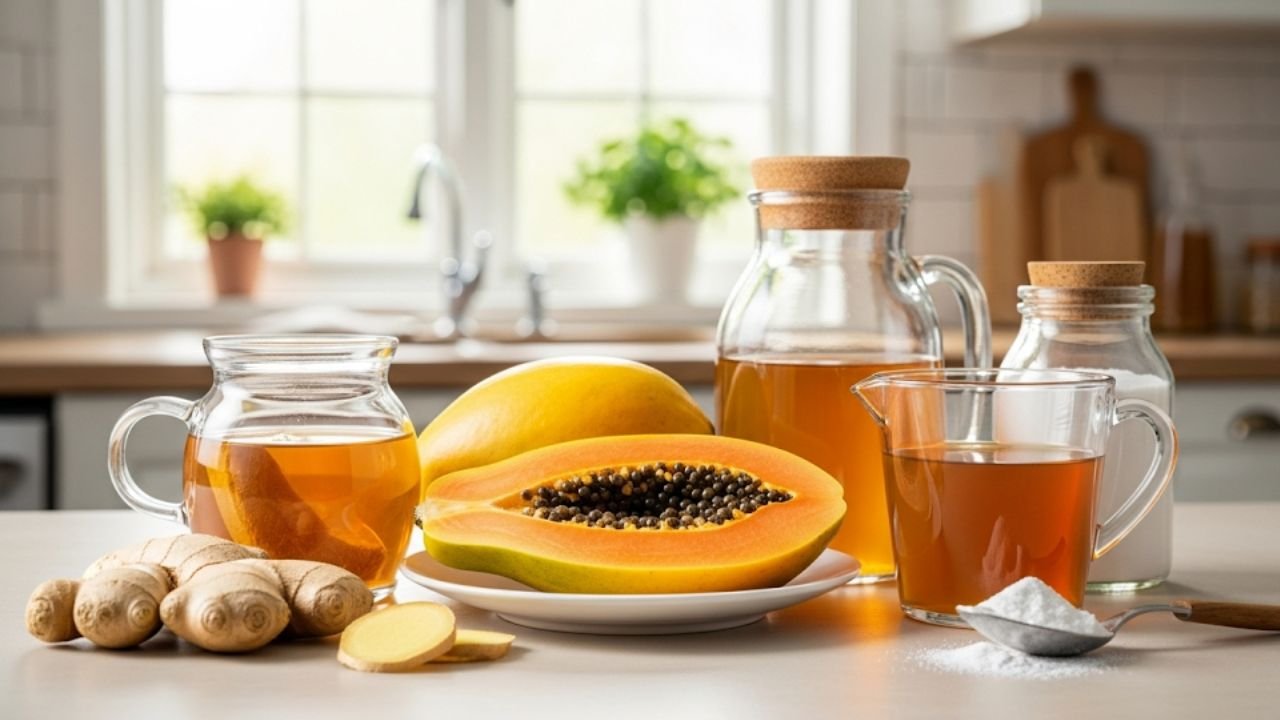12 Home Remedies for Acid Reflux Relief

We’ve all been there. That uncomfortable burning in your chest after a meal, the sour taste creeping up your throat, and the regret that comes from that second plate of spicy pasta. Acid reflux, often called heartburn, isn’t just annoying—it can hijack your entire day or night.
But what if you could calm the storm naturally, without reaching for antacids every time? The truth is, your kitchen might already hold the secret weapons you need. With a blend of old wisdom, personal trial and error, and research-backed remedies, I’m here to walk you through 12 home remedies for acid reflux relief that have helped me and many others find real comfort.
Whether you’re someone who faces acid reflux now and then or it’s become a daily nuisance, these natural remedies could bring you the relief you’ve been craving—without side effects.
1. Sip on Aloe Vera Juice (Nature’s Cooling Hug)
There was a time when I thought aloe vera was just for sunburn. Turns out, it’s also a gentle warrior for your gut. Aloe vera juice soothes inflammation along your esophagus and stomach lining—kind of like a soft, cool cloth over a burn.
Why it works: Aloe’s natural anti-inflammatory properties calm the irritated tissue caused by acid reflux. It also helps balance stomach acid, reducing that horrible burn.
How to use it:
-
Drink 1/2 cup of unsweetened aloe vera juice 20 minutes before meals.
-
Make sure it’s food-grade and doesn’t contain latex or aloin (both are laxatives).
Tip: Start slow. Some people find aloe vera juice a bit strong at first.
2. Ginger: Your Gut’s Best Friend
Ginger is one of those spices that your grandma always recommended—and she was right. It’s been used for centuries to treat digestion issues, and acid reflux is no exception.
Why it works: Ginger reduces inflammation and supports gastric emptying, which means food doesn’t sit around fermenting and pushing acid up your throat.
Ways to use ginger:
-
Fresh ginger tea (boil 1–2 slices in water)
-
Add grated ginger to meals
-
Chew on candied ginger in moderation
Bonus: Ginger also helps with nausea, so it’s a win-win if your reflux makes you feel queasy.
3. Apple Cider Vinegar: Counterintuitive but Effective
Okay, this one sounds weird. Why would adding acid help with acid reflux? Well, sometimes the problem isn’t too much acid—it’s too little. Your stomach might not be digesting food properly, causing it to ferment and push up acid.
Why it works: A small amount of apple cider vinegar (ACV) can help balance stomach pH and improve digestion.
How to take it:
-
Mix 1 tablespoon of ACV in a glass of warm water
-
Drink 30 minutes before meals
Note: This doesn’t work for everyone. If it makes your symptoms worse, skip it.
4. Chew Gum: Yes, Really!
This one blew my mind when I first heard it. But yes—chewing gum after meals can help reduce acid reflux. Not a mint fan? No problem. Go for fruit flavors.
Why it works: Chewing increases saliva, which helps neutralize stomach acid and wash it back down.
Look for:
-
Sugar-free gum (xylitol-based is better)
-
Avoid peppermint or spearmint (they relax the LES—lower esophageal sphincter—and can make things worse)
Best time: 30 minutes after a meal.
5. Slippery Elm: Your Gut’s Protective Blanket
Slippery elm sounds like something out of a fairy tale, but it’s very real and very soothing. Native American cultures have used it for centuries to protect the digestive tract.
Why it works: It coats your esophagus and stomach lining, creating a natural barrier against acid.
How to take it:
-
Mix 1 teaspoon of slippery elm powder in warm water
-
Drink before meals or bedtime
Consistency: It’s thick and gooey—an acquired taste, but effective!
6. Eat a Ripe Banana Daily
Bananas are easy, cheap, and surprisingly effective. A ripe banana can help keep acid reflux in check while also offering potassium and fiber.
Why it works: Bananas coat the stomach lining and contain compounds that help produce mucus—protecting you from acid burns.
Best way to eat:
-
Fresh and ripe (avoid overly green ones)
-
As part of your breakfast or an afternoon snack
Avoid if: You notice bananas make your symptoms worse—this happens to a small number of people.
7. Try Oatmeal in the Morning
Ever notice how certain breakfasts make reflux worse? Oatmeal is the opposite—it’s comforting, filling, and kind to your stomach.
Why it works: Oatmeal absorbs acid and prevents reflux while keeping you full, which reduces overeating.
Simple recipe:
| Ingredient | Quantity |
|---|---|
| Rolled oats | 1/2 cup |
| Water or almond milk | 1 cup |
| Banana slices | 1/2 medium |
| Honey (optional) | 1 tsp |
Eat slowly and avoid adding citrus or chocolate, which can trigger reflux.
8. Avoid Eating Late at Night
This one is more a habit change than a home remedy, but it’s powerful. I used to snack at midnight and wake up with a burning throat. Once I stopped, my reflux improved overnight—literally.
Why it helps: Lying down soon after eating makes it easier for stomach acid to travel upward.
Tips:
-
Eat dinner 3 hours before bed
-
Avoid lying flat after meals
-
Prop up your upper body when resting
A wedge pillow can be a game-changer!
9. Chamomile Tea: Calm for the Stomach and Mind
Chamomile isn’t just a sleepy-time tea—it’s a soothing herbal remedy that’s gentle on your stomach.
Why it works: Chamomile reduces inflammation, calms the nervous system, and may lower stomach acidity.
How to enjoy:
-
Steep 1 chamomile tea bag in hot water for 5 minutes
-
Drink before bed or after meals
Bonus: It helps with stress, which is a hidden reflux trigger.
10. Baking Soda Water: Quick, Temporary Relief
If you’re desperate and in pain, baking soda might be your temporary rescue. My cousin swears by it when nothing else is around.
Why it works: Baking soda is alkaline and neutralizes stomach acid quickly.
How to use:
-
Mix 1/2 teaspoon in a glass of water
-
Sip slowly
Important: Don’t rely on this daily—it can mess with your sodium levels and pH balance.
11. Licorice Root (DGL): Sweet Relief
Licorice is more than candy. Deglycyrrhizinated licorice (DGL) helps the stomach produce protective mucus.
Why it works: It strengthens your stomach lining and reduces the effect of acid.
How to take it:
-
DGL tablets or chewables before meals
-
Make sure it’s labeled deglycyrrhizinated (to avoid blood pressure issues)
It takes a few days to feel the full effect, but it’s worth the wait.
12. Stay Hydrated (But Smartly)
Water seems like the simplest thing, right? But how and when you drink it can make a huge difference for acid reflux.
Why it works: Water dilutes stomach acid and helps digestion. But chugging water with meals can actually bloat the stomach and increase pressure.
Best practices:
-
Sip water throughout the day
-
Avoid drinking large amounts during meals
-
Add cucumber or mint for gentle flavor (but not too much mint!)
🫙 Fun idea: Keep a small infused water jar in your fridge to encourage regular sipping.
Final Thoughts: Reclaim Your Comfort
Living with acid reflux can feel like a constant guessing game. One wrong bite and you’re up all night with burning pain. But these home remedies—many of which come straight from nature and your pantry—offer real, gentle relief without side effects.
Quick Recap of Natural Remedies:
-
Aloe vera juice
-
Ginger
-
Apple cider vinegar
-
Chewing gum
-
Slippery elm
-
Ripe bananas
-
Oatmeal
-
Avoid late meals
-
Chamomile tea
-
Baking soda
-
Licorice root (DGL)
-
Staying hydrated
Not every remedy will work for everyone, and that’s okay. The key is to experiment gently, listen to your body, and create habits that support healing.
Reflux doesn’t have to control your life. With the right mix of mindfulness, natural support, and a few pantry heroes, you can find relief—and enjoy your meals again.
